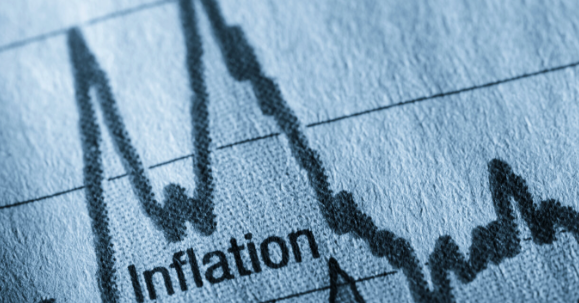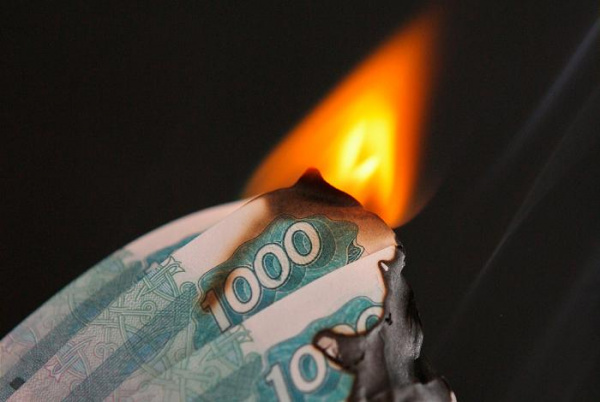How to save your money during inflation
Every trader knows that inflation has a negative impact on the market. From the market's point of view, inflation is characterized by an increase in the cost of goods and services. This name is derived from the Latin word "inflatio" - "swelling".
Since inflation devalues money, you will have to pay more for the same product under the influence of inflation in the future. In other words, the purchasing power of people decreases, and the money supply depreciates. In this regard, inflation can be called one of the most important economic indicators, which significantly affects the economy, including the exchange rates.

The inflation mechanism works like this: high inflation forces the Central Bank to make changes to its monetary policy, including the foreign exchange component. As a result, there are changes in exchange rates. At the same time, the level of inflation can be used to judge how healthy the national economy is. The decline or growth of the currency supply does not go unnoticed by the market. It leads to various violations of financial mechanisms, and the aggregate level of prices for services and goods unreasonably rises or falls. As a result, the economy can either overheat or stagnate.
Thus, it is a priority for regulators in all countries to control this process using tools such as changes in the critical rate, the redemption of government loans, etc.
The types of inflation
Today, there are several types of inflation:
• Moderate inflation is characterized by an increasing up to 10% per year. Such growth rates are observed in developed countries. Moderate inflation is believed to be good for the economy, as it pushes up prices and pushes up wages, stocks, and real estate.
• With galloping inflation, prices rise by 20%, 30%, and even 50% per year. It is essential to take timely measures to curb inflation at this stage. In this case, we can say that the country's economy is unhealthy. Otherwise, it may turn into hyperinflation.
• In the case of hyperinflation, price increases are measured in hundreds and thousands of percent, and money turns into ordinary paper. Typically, such inflation occurs during a period of political and social upheaval and provokes a change in the political elite and money.
It is also necessary to highlight the inflation of demand and costs.
• The first occurs when the demand for goods increases. Usually, it can be provoked by a sharp reduction in supply, for example, by a crop failure. Demand inflation can be spurred by an increase in the money supply while maintaining the supply level, pushing sellers to increase the price of goods.
• Cost-push inflation occurs when goods become more expensive to produce, for example, due to a decrease in resources and the need to use more expensive technologies for extraction. As a result, the price of the commodity rises.
Given the importance of the inflation rate for assessing the state of the economy, several indicators are used to measure it. The consumer price index CPI can be called the main one. You can determine how
the consumer basket has changed with a particular set of goods.
Among other indicators of the inflation rate, one can single out the PPI producer price index,
GDP Deflator, Paasche Index, and Asset Price Index.

Inflation and exchange rate
Rising inflation leads to currency depreciation. In other words, if a country faces increasing inflation, its national currency rate will be lower than the rate of the national currency of a country where inflation is lower.
At the same time, the growth of the consumer price index may serve as a signal for the Central Bank to increase the refinancing rate, which will positively affect the national currency.
Therefore, it cannot be said that an increase in inflation will necessarily lead to a depreciation of the national currency and a decrease in its exchange rate against other currencies.
Do not forget about inflation rates, which also meaningfully affect the exchange rate. A high inflation rate devalues the national currency's exchange rate in the absence of other vital factors. But such a relationship can be traced in the medium and long term. It takes at least two years for recovering the exchange rate in relation to purchasing power.
The most crucial dependence of the national currency's exchange rate on inflation rates can be traced in countries with serious international volumes of exchange of goods, services, and capital. This is due to the close dependence of inflation rates and the exchange rate dynamics, calculated based on export prices.
The national currency's exchange rate is based on many different factors, and inflation is only one of them, although a crucial one. In addition to inflation, one should also not forget about such indicators as the balance of payments, the global political and economic situation, etc. At any given time, the impact on the exchange rate of one of them may be more significant than the others. At the same time, understanding how inflation affects the exchange rate can be helpful for decision-making in the long and medium-term.

Ways to avoid the effects of inflation
The comparability of the growth of income to the growth of the inflation rate is the primary condition for offsetting the impact of inflation. To protect savings, some prefer to use a deposit, but at the same time, the yield on it is often lower than inflation. It is much wiser to invest in the stock market, given the risks of such investments. What assets can you invest in so that inflation does not eat your savings?
• The property. You can also invest in real estate through the so-called REITs (real estate investment trusts).
• Stock. Such investments make you the owner of a part of the business, which makes it possible to receive income in the form of dividends or from the sale of securities. But only stocks selected as a result of the careful analysis will bring gain. Moreover, it is unnecessary to analyze the entire stock market, but only those companies that will benefit from inflation and rising interest rates. For example, companies produce essential products. Pharmaceutical businesses and banks will also remain in the black, while car manufacturers, airlines, tourism, and entertainment will be red.
• Federal loan bonds. They are considered the most reliable asset and allow you to save your savings.
• As an option to save your money, you can consider copy trading. For example, in RAMM. Many large brokers, like AMarkets, have a similar service. Here you will find a large selection of strategies to cope with different levels of risk, and you will be able to build your investment portfolio.
• Gold. Allows you to protect yourself from inflation because it does not lose its value and serves as a "protective asset." Gold can be bought in the form of bars and on the stock exchange. Alternatively, you can purchase shares in a gold mining company.
• Mutual funds managed by professional managers. This significantly reduces risks as professionals diversify the portfolio intelligently, achieving the best return.



